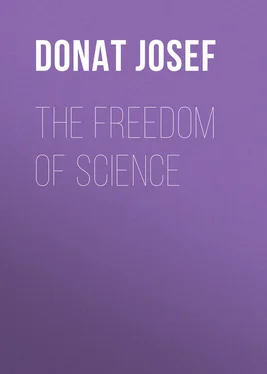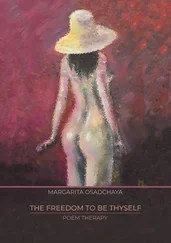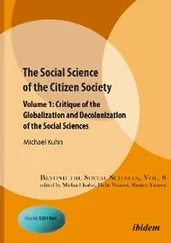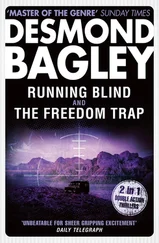Josef Donat - The Freedom of Science
Здесь есть возможность читать онлайн «Josef Donat - The Freedom of Science» — ознакомительный отрывок электронной книги совершенно бесплатно, а после прочтения отрывка купить полную версию. В некоторых случаях можно слушать аудио, скачать через торрент в формате fb2 и присутствует краткое содержание. Жанр: foreign_antique, foreign_prose, на английском языке. Описание произведения, (предисловие) а так же отзывы посетителей доступны на портале библиотеки ЛибКат.
- Название:The Freedom of Science
- Автор:
- Жанр:
- Год:неизвестен
- ISBN:нет данных
- Рейтинг книги:4 / 5. Голосов: 1
-
Избранное:Добавить в избранное
- Отзывы:
-
Ваша оценка:
- 80
- 1
- 2
- 3
- 4
- 5
The Freedom of Science: краткое содержание, описание и аннотация
Предлагаем к чтению аннотацию, описание, краткое содержание или предисловие (зависит от того, что написал сам автор книги «The Freedom of Science»). Если вы не нашли необходимую информацию о книге — напишите в комментариях, мы постараемся отыскать её.
The Freedom of Science — читать онлайн ознакомительный отрывок
Ниже представлен текст книги, разбитый по страницам. Система сохранения места последней прочитанной страницы, позволяет с удобством читать онлайн бесплатно книгу «The Freedom of Science», без необходимости каждый раз заново искать на чём Вы остановились. Поставьте закладку, и сможете в любой момент перейти на страницу, на которой закончили чтение.
Интервал:
Закладка:
1. Authority of Faith and Private Authority
We often meet with the most inconceivable notions. We are told quite seriously that the Church teaches, and that the Catholic has therefore to believe, that the earth is a flat disc surrounded by the sea, as the ancients believed; above it is a vault, below it hell-fire; that the earth stands still and the sun and stars revolve about it, just as Ptolemy of Egypt taught; that God created the whole world just as it is now in exactly six days of twenty-four hours each; that He made the sun and moon, just as they are now illuminating the skies; that the strata, just as they now look when bared by the geologist's hammer, even the coal-fields and petrified saurians and fossils – all were made, just as they now are, well nigh six thousand years ago. The Scriptures teach this, the Fathers of old and the theologians believe this: and that is where the Catholic must get his science. And then they are astonished, and consider dogma retreating before science, when they see other notions prevailing, when they see Catholic scientists defend without prejudice the evolution of the solar system, and even the system of the whole universe, from some primitive matter, or assume an organic evolution, as far as science supports it (cf. Braun , Ueber Kosmologie u. Standpunkt christlich. Wiss., 2d ed., 1906, etc.). They would be still more astonished perhaps to learn that similar ideas had long ago been proposed by St. Augustine and St. Thomas (cf. Summa c. G. l. 3, c. 77; Knabenbauer , in Stimmen a. M. Laach xiii, 75 seq. ).
A distinction must be made between the teaching of the Church and the private views of individuals, schools, or periods. Only the teaching of the Church is the obligatory standard of Christian and Catholic thought, not the opinion of individuals. Hence not everything that Catholic savants have held to be true belongs to the teaching of the Church. Only when theologians unanimously declare something to be contained in the deposit of revealed truth, or the teaching of the Church, – only then is their teaching authoritative; not because it is the teaching of theologians, but because it is contained in revelation or the teaching of the Church. Else the maxim holds good: Tantum valet auctoritas, quantum argumenta . Nor is all that which a former age found in Holy Scripture, therefore to be believed as revealed truth, to the exclusion of all other interpretations.
The foregoing may be elucidated by the examples given above. When Holy Writ describes in figurative language and Oriental, demonstrative style, how God created the heaven and earth, the sun and moon, the sea and its contents, it means to teach us religious truths: that God is the First Cause of everything, and hence that the sun and moon, for instance, are not uncreated deities, as the Egyptian believed them to be. The narrative need not be taken in a literal sense, as if God immediately formed everything in the exact condition as it now appears to us; it may be interpreted in the sense that God let the present condition of things gradually grow out of the forces and materials and plan of nature He created, the result of a lengthy evolution. When our Lord tells us in the gospel that His Father in heaven feeds the birds of the air and clothes the grass of the field, we know that this is to be understood as a mediate action of God, which He exercises through the instinct of animals and through natural forces which He created for the purpose. Now when former ages, reading the narrative of Genesis, generally understood an immediate creation of the world, because the knowledge of nature at the time did not admit of any other interpretation, it is by no means necessary to conclude from it that every other interpretation must be rejected as against the Bible, or that the Church herself has prescribed this literal interpretation as the only correct one. As is known, St. Augustine , the greatest Father of the Church, had another very liberal explanation of the Genesis narrative, and the Church has never censured him. (He taught that the whole world had been created at one time, and that the six days of the Mosaic narrative were the logical divisions of an account of the various orders of creatures.) And now the interpretations vary greatly. The passages in Scripture, in which, according to popular modes of expression, the sun is said to rise and set and revolve about the earth, the latter standing in the centre of the world – these, too, were interpreted literally in the days of the Fathers: there was no cause for interpreting them otherwise; but it was only due to defective knowledge of nature at the time. These temporary errors remained till corrected by research in the field of the natural sciences: had the discoveries been made sooner, the errors, too, would have disappeared sooner.
The Church knows, and the holy Fathers knew, that it is not the purpose of Holy Writ to teach profane sciences, but to instruct in faith and morals; if it speaks of other matters, it is but occasionally, and then in the idiom of common life, which is not the same as the scientific language of the specialist. Indeed, the Bible does not intend to give scientific instruction in such matters, nor could it have done so at a time when men were not ripe for such enlightenment.
Thus St. Augustine insists that the Spirit of God who spoke through the authors of Scripture did not intend to instruct men in matters which do not serve for salvation, and hence he objects to the Scriptures being taken literally in regard to such matters, because the Bible adapts itself to man's manner of speech: a distinction is to be made between letter and sense (“Multi multum disputant de iis rebus, quae majore prudentia nostri auctores omiserunt, ad beatam vitam non profuturas discentibus … Breviter dicendum est, … Spiritum Dei, qui per ipsos loquebatur, noluisse ita docere homines nulli saluti profuturas,” De Gen. ad lit., II, 9, n. 20. Cf. De Gen. contra Manich. 1, 5, n. 3; 11, n. 17). He further cautions Bible students against putting their own interpretation upon obscure passages and then claiming it to be dogma, because one may easily go astray and thus make the Scriptures appear ridiculous. “In rebus obscuris atque a nostris oculis remotissimis, si qua inde scripta etiam divina legerimus, quae possint salva fide, qua imbuimur, alias atque alias parere sententias, in nullam earum nos praecipiti affirmatione proiciamus, ut si forte, diligentius discussa veritas eam recte labefactaverit, corruamus, non pro sententia divinarum scripturarum sed pro nosctra ita dimicantes, ut eam velimus scripturarum esse, quae nostra est” (De genesi ad lit. I, 18 n. 37). “Plerumque accidit, ut aliquid de terra, de coelo, de ceteris mundi huius elementis … etiam non christianus ita noverit, ut certissima ratione et experientia teneat. Turpe est autem nimis et perniciosum ac maxime cavendum, ut christianus de his rebus quasi secundum christianas literas loquentem ita delirare quilibet infidelis audiat, ut, quemadmodum dicitur, toto coelo errare conspiciens, risum tenere vix possit” (Ibid. I, 19 n. 39). Cf. also I, 21. St. Thomas of Aquin also expresses himself in this sense: “Multum autem nocet, talia, quae ad pietatis doctrinam non spectant, vel asserere vel negare, quasi pertinentia ad sacram doctrinam … Unde mihi videtur tutius esse, ut haec, quae philosophi communius senserunt et nostrae fidei non repugnant, neque sic esse asserenda ut dogmata fidei, licet aliquando sub nomine philosophorum introducantur, neque sic esse neganda tamquam fidei contraria, ne sapientibus huius mundi contemnendi doctrinam fidei occasio praebeatur”(Opusc. X. ad Jo. Vercel. Proem.).
The doctrine of the Church concurs with this, as laid down in numerous documents, many of them quoting the above-mentioned words of St. Augustine . It also insists that the interpretation of the Fathers be only taken as a standard of the Church's explanation of the meaning of Scripture when they are unanimous on the meaning of a passage relating to faith and morals; but not to other things (cf. Encycl. Providentissimus, Denz. 10 ed., n. 1947, 1944; Conc. Trid., sess. IV., Conc. Vat. sess. III., c. 2, Denz. nn. 786, 1788).
Читать дальшеИнтервал:
Закладка:
Похожие книги на «The Freedom of Science»
Представляем Вашему вниманию похожие книги на «The Freedom of Science» списком для выбора. Мы отобрали схожую по названию и смыслу литературу в надежде предоставить читателям больше вариантов отыскать новые, интересные, ещё непрочитанные произведения.
Обсуждение, отзывы о книге «The Freedom of Science» и просто собственные мнения читателей. Оставьте ваши комментарии, напишите, что Вы думаете о произведении, его смысле или главных героях. Укажите что конкретно понравилось, а что нет, и почему Вы так считаете.












